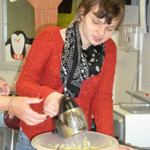Fostering independence in children is an important goal of any parent. Through different developmental stages, progressive “windows of opportunity” emerge to foster skills that will ultimately lead to independence. Understandably, parents want their children to be ready when these changes occur.
How can I help my special needs child increase their level of independence?
For all children, and especially those with special needs, achieving independence is an important part of the journey into adulthood. From the moment we wake in the morning, we go through certain tasks, known as “life skills.” These tasks could include typical activities such as making the bed, performing bathroom routines, getting dressed, making meals, communicating and so many others. For most, the list is virtually endless.
But with the right preparation and patience, children can develop the essential skills required to foster independent living. And beyond just telling students how to practice these essential life skills, students must be guided in a practical way so that they not only learn about what is being taught but learn how to apply it in the real world.
The 10 Essential Life Skills for Special Needs Children

Life skills for special needs children play an essential role in improving sensory processing, communication, safety, social relationships and ultimately, acquiring independence. Here are just 10 of the essential life skills we cover with our students at Alpha School:
1. Self-Care
Create and rehearse daily routines such as personal daily hygiene, proper nutrition, exercise, getting dressed, table manners, dealing with common illnesses such as a cold, managing stress, etc.Enter your text here...
2. Pre-Vocational Skills
Transition youth from being a student to being a contributing member of society by developing skills such as looking and applying for a job, interviewing, understanding job requirements, etc.
3. Daily Living Skills
Develop practical living skills such as safety, finding information (internet), traveling (reading a map), home care (housecleaning), money skills (bank accounts), shopping, etc.
4. Community-Based Instruction
Focus on social skills and safety as students gain experience in different community environments.
5. Leisure and Recreational Skills
Encourage and guide students to use their talents as they establish important job skills.
6. Functional Reading
Apply visual communication methods such as recognizing symbols, reading maps and signs, navigating the internet, etc., to help students make important day-to-day choices.
7. Functional Math
Teach students to count money, tell time, manage personal budgets, measure and understand volume, etc., to improve real-life decision-making skills.
8. Work-Related Behaviors
Expose students to the workforce where they will have the opportunity to directly apply job-related behaviors and emphasize good work habits such as following directions, being punctual, understanding authority and working as a team.
9. Shopping Skills
Prepare students to apply skills in a variety of different business experiences from creating a shopping list to using money to purchase goods at the grocery store.
10. Cooking and Laundry Skills
Learn and apply more in-depth daily living skills and chores, such as cooking and laundry skills. This not only establishes a responsibility for routines and organizational skills but also sets a foundation for self-sufficiency.
Life Skills for Special Needs Children at Alpha School
In addition to the academic programs at Alpha School, students are exposed to a wide range of practical and functional living skills designed specifically to prepare them to live in their community, engage in the workplace and feel independent at home. Since 1980, RKS Associates has been a leader in meeting the needs of special education students and helping children grow to their fullest potential.
To learn more about why our life skills program is the most effective way to help your child, contact us at our main office at 732.370.1150 or find an RKS location near you.